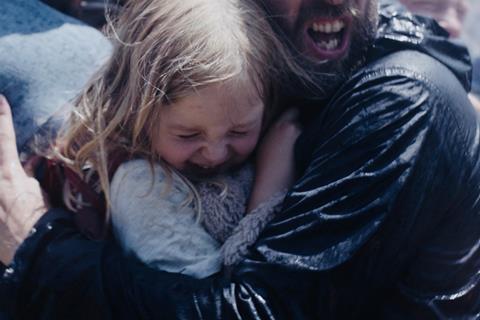A young boy and his father must flee their Swedish home in the wake of civil unrest

Dir: Jesper Ganslandt. Sweden-Austria-Croatia. 2018. 91mins
Competently made but thematically problematic, the fourth film from Jesper Ganslandt (The Ape, Falkenberg Farewell) walks a precarious line between being an interrogation of white Western privilege, and being an example of it. The film posits a scenario in which civil unrest makes life in Sweden untenable and, together with his father (Gansladt), four-year-old Jimmie (played by Ganslandt’s son Hunter), are forced to flee as refugees. Although well-intentioned, the perception that putting a blond, Scandinavian face onto the migrant crisis makes it somehow easier for Western viewers to identify is unlikely to endear this film to audiences.
The suspect central idea notwithstanding, this is a polished piece of filmmaking
The opening film at Rotterdam, Jimmie won the Eurimages Lab Project Award at Haugesund Film Festival in 2016. It will go on to play at Göteborg Film Festival, before opening in Sweden (from Tri Art Film) at the beginning of March. Further festival slots are possible, however the potentially controversial nature of the material is likely to scare off all but the most fearless distributors. The fact that the film, with a straight face, employs the same racial inversion as a satirical artwork in Ruben Ostlund’s The Square unfortunately doesn’t help its case.
The suspect central idea notwithstanding, this is a polished piece of filmmaking. Ganslandt’s direction of his young son is impressive, resulting in a textured, unaffected, naturalistic performance uncontaminated with any hint of child acting. A non-linear structure captures something of the disorientating assault of a uncertain world as experienced by a four-year-old who hasn’t quite grasped the gravity of the situation. As Jimmie and his father drive away from their home, the child eagerly points out the massing military helicopters and the explosions. To Jimmie, it looks like a firework display.
Two timelines unfold in parallel. The first explores the journey of Jimmie and his dad up until the point when they are separated; the second sees Jimmie, adopted by a family of fellow refugees when they find him alone, smuggled across borders to a place where it is hoped he will be reunited with his father. But even within each timeline, the stories are non-linear, which can make the whole film a little bewildering at times. Clarification comes through a sporadic voice over in which the father talks to his son, apologising for the lie he told to give his child hope and to help him face the journey.
The score and sound design, working in tandem, are particularly effective. The sound drops out, suggesting Jimmie’s attention wandering far away from the gruelling slog of his days on the road. The throbbing score injects a sense of threat to even seemingly benign moments, while handheld camera captures lives lived on the fly. It’s unnerving and urgent, but audience members prone to motion sickness might find the cumulative impact of all the shaky camera a little hard to endure.
Ultimately, however, you can’t help but wish that Ganslandt had chosen to use his obvious skill as a filmmaker to document a genuine migrant story rather than to manufacture a fake one.
Production company: Fasad AB
International sales: Fasad AB info@fasad.ab
Producers: Juan Pablo Libossart, Jesper Kurlandsky, Hedvig Lundgren, Jesper Ganslandt
Cinematography: Måns Månsson
Editors: Jesper Ganslandt, Magnus Svensson
Production design: Johan Broomé
Music: Jon Ekstrand
Main cast: Jesper Ganslandt, Hunter Ganslandt, Christopher Wagelin, Anna Littorin, Marita Fjeldheim Wierdal, Ellen Sarri Littorin















![[L-R]: Amanda Villavieja, Laia Casanovas, Yasmina Praderas](https://d1nslcd7m2225b.cloudfront.net/Pictures/274x183/6/4/1/1471641_pxl_20251224_103354743_618426_crop.jpg)








